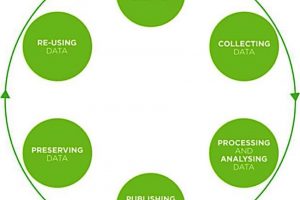Delivering data management training at Leiden
How is data management training delivered across the university? What can we share and learn from each other? And how can we make the most of what’s available? The Data Management Network met to learn about and discuss these topics.
On Friday 30th October the Leiden University Libraries' Centre for Digital Scholarship coordinated a meeting to discuss how data management training was delivered to research staff across the university.
More than twenty members of the Data Management Network came together in a virtual meeting room to learn about what's going on and to discuss how we might develop the training opportunities on offer.
The presentations began with an introduction to the new e-learning module developed at the Leiden University Medical Centre (LUMC) and launched to the first set of users in September and October 2020. The module, Data Stewardship, aims to give a participant all the information they need to write a data management plan (DMP) using a combination of static and interactive information. It is divided into eight parts: an introduction and an explanation of what is meant by data, followed by six parts that relate to the different moments during the research data life cycle (see the image).


Participants on the LUMC training course therefore now begin by following the module in their own time before a given deadline, then they write a draft DMP, and review the DMPs of two other people on the course, before finally coming together in person (virtually) to discuss and review what they have learnt and to raise any outstanding questions.
The training was previously wholly delivered by the trainers in person over several days, but with an expectation of rising demand for the course, the e-learning module was introduced to create more time for spending face-to-face with a larger number of researchers.
Following interest from members of the Data Management Network we plan to organize a follow-up meeting to investigate adapting the module for use within different institutes or faculties.
The next presentations on the agenda were from the University’s Centre for Digital Scholarship (CDS) and from Human Resource Management (HRM).
The range of training offered by CDS is a combination of generic training open to all, and tailor-made training that is adapted to account for the specific needs of a faculty or institute. Included in the latter are the introductory training sessions for new PhD candidates which introduce them to data management and help them write their first data management plan, and the ‘bring your own data’ training which provides hands-on help to produce FAIR datasets.
Following many questions about data publishing, CDS designed a new workshop on this topic that was introduced earlier in 2020, however, uptake hasn’t been as great as expected so the CDS team intend to make the materials available online so people can read the information and try out the exercise in their own time. Talking about why this workshop hadn’t succeeded in attracting more interest led to a discussion about the timing of training opportunities for PhD candidates, and the need to provide information or training at the moment the researcher needs answers. Online modules, perhaps with in-person consultation opportunities, could be a way to solve this.
Human Resource Management Learning and Development (HRM) at Leiden University delivers training aimed at developing personal skills such as leadership, communication and personal effectiveness. One of the HRM modules is on Scientific Integrity which consists of five sections:
- Introduction to Research Integrity
- Ethical standards for researchers
- Research ethics
- Fabrication, Falsification and Plagiarism
- Questionable Research Practices
Being about integrity, the lessons focus on how to avoid, or deal with, unethical behaviour. The section on data management is included in the Research Ethics section and takes the same perspective: reminding researchers what they should take into consideration concerning their data management, and why.
The pathway envisaged for PhD candidates by HRM sees this module being delivered during the first year, or early part of the project. By the second year the courses offered are more aligned with project/time management and communication, and then in the final stages of the project towards job orientation. They assume that in-depth training on data management will take place through library (CDS)-delivered courses arranged with the faculty graduate schools.
There followed a very lively discussion about how, when and to whom, to deliver data management training at Leiden in the future. This also touched on how and when to introduce data management to undergraduates or Masters students. It was also clear that at the moment not all researchers and research support staff know about what is available.
We also discussed how the impact of our training could be measured. At the moment, although we may be assessing how well our training is received, we are not investigating the impact – whether researchers change or improve their data management practices as a result of receiving the training, nor whether we are delivering the training in the right way at the right time.
In closing, members of the Network were invited to try out the recently launched Data Horror Escape Room – a fun way to introduce data management to new researchers. And participants in the meeting who were not yet members of the Network were invited to register for the Data Management Network and therefore receive further news and information.
How RDM training might be developed
Following the discussion this is how participants thought data management training at Leiden could be developed:
- Develop e-learning opportunities but look at ways to combine them with live sessions.
- Think about how to introduce data management at different levels from bachelor through masters to PhD; look for opportunities to combine or include data management with ethics.
- Focus on the early years of a PhD and assume that in the final years they will not be looking for training on data management but for answers and support.
- Start to think about how to measure the impact of data management training.
- Raise awareness about data management and the training opportunities available across the university.
Next steps
The Data Management Network will start to investigate the possibilities of online training for data management across Leiden University:
- CDS staff will liaise with services and experts within the university (such as the Centre for Innovation, and faculty services such as SEEDS - Support E-learning and Educational Development for Science) to learn more about technical infrastructure and support.
- Arrange a second meeting of the Data Management Network on this topic to take forward the development of online modules.
- Consider inviting other university speakers to tell us more about their online modules, especially how they adapt them for different faculties.
The Network will look at increasing publicity about existing training courses and materials:
- Ensure Graduate Schools have information about research data management training courses.
- Produce a fact sheet about data management training opportunities to inform Graduate Schools and other Leiden University trainers.
- Find ways to raise awareness among research staff.
We look forward to taking these forward with the Data Management Network members.
Agenda of the Meeting
Data Management Network meeting: Delivering data management training
10:00 – 12:00 Friday 30 October 2020
Location: Kaltura Liveroom
10:00 Welcome and introductions
10:20 Delivering data management training via E-learning – results from the first delivery.
Martiene Moester, Specialist Medical Research Data Management, LUMC
10:40 Questions and discussion
10:55 Overview of data management training at Leiden
Michelle van den Berk, Digital Scholarship Librarian, Centre for Digital Scholarship
11:15 Scientific Conduct Course
HRM Learning & Development (contacts: Jasmijn Mioch & Anita Romijn)
11:35 Discussion: topics, challenges and priorities
11:55 Close
12:00 Session ends





